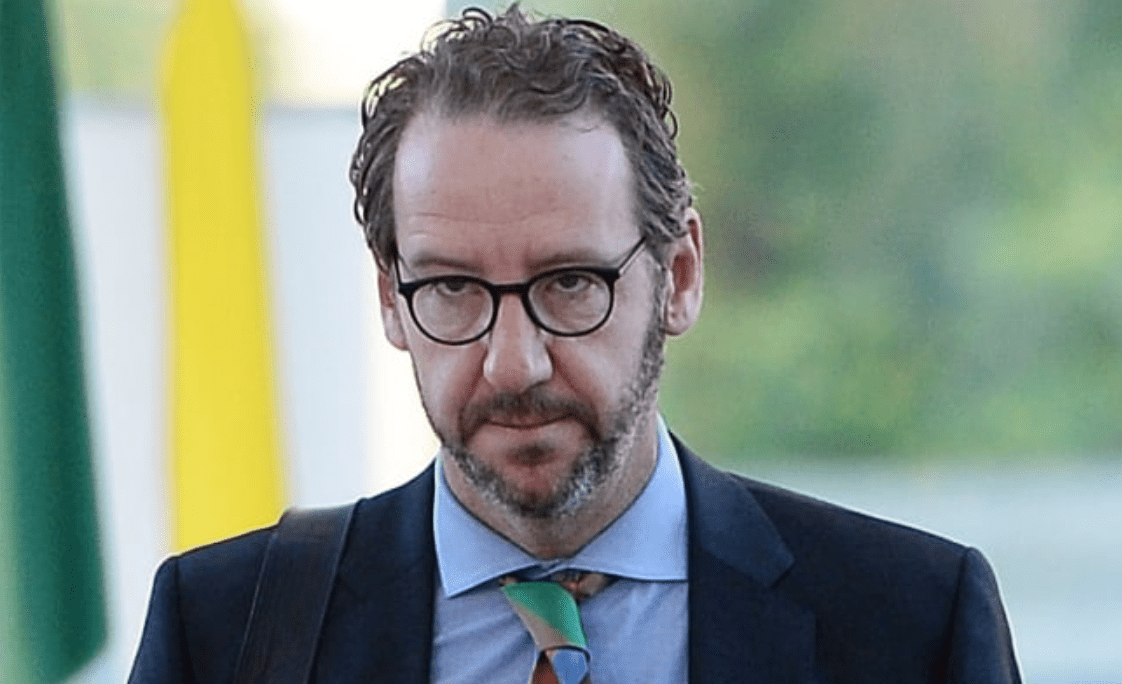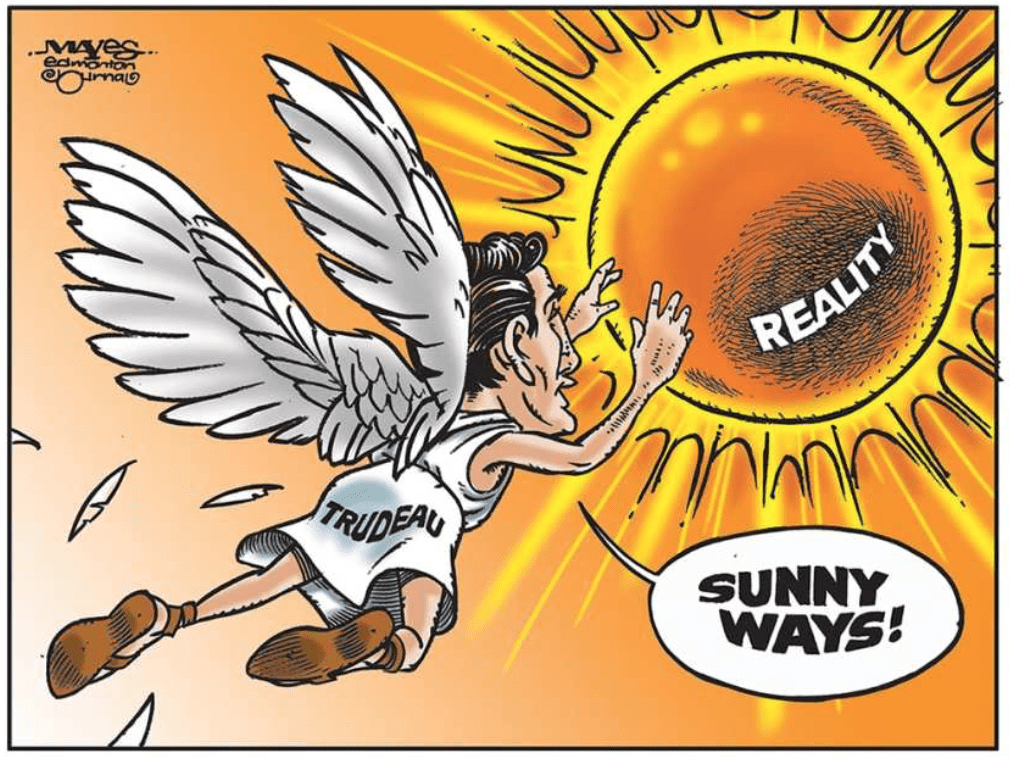This content is restricted to subscribers

The views, opinions and positions expressed by columnists and contributors are the author’s alone. They do not inherently or expressly reflect the views, opinions and/or positions of our publication.

This content is restricted to subscribers
The views, opinions and positions expressed by columnists and contributors are the author’s alone. They do not inherently or expressly reflect the views, opinions and/or positions of our publication.

The thing about l'affaire Lavalin, the part that really burns me up, is how much of a betrayal it feels like.
Not of me as some sort of Liberal partisan — readers of this space hopefully don't see me as one of those — but as someone who had some sincere hopes this government might live up to its lofty ideals of "real change."
That is now, quite plainly, a farce.
There have been signs along the way things had gone astray. There's the quick ditching of electoral reform, the utter failure to even try to fix the access to information system because that might be awkward if people saw how government actually worked. Who can forget the insistence on prosecuting an admiral for leaking information on ship building, while knowing someone else had also leaked similar information unpunished, and then going around and hiring the reporter the admiral leaked to. And of course there's the daily onslaught of meaningless drivel coming out of the mouths of every spokesperson and minister.
But this, this thing with SNC-Lavalin has the feeling of a final break. The culmination of what has been staring us in the face all along: this government is just like all the others.
And, you know, I'm not even sure whether the thing that's upsetting me is the pressure applied — excuse me, allegedly applied — by the prime minister's office to former attorney general and justice minister Jody Wilson-Raybould.
What the scandalous allegations, first broken by The Globe and Mail, have done is to bring into the open what the government plainly didn't want to talk about.
When they slipped in changes to the Criminal Code adding the possibility of "deferred prosecutions." These are where, essentially, a company admits it did a bad thing, agrees to do better, and ponies up a bunch of cash as way of contrition. What it avoids is that company being criminally sanctioned and cut off from, say, bidding on federal construction contracts for a decade.
Was this put in place solely for the benefit of SNC-Lavalin? Who knows. They certainly liked the idea, however. Enough to send legions of lobbyists out to everyone with ears, eyes, or at least a faint pulse to make the case they should have their prosecution on charges of bribing Libyan officials deferred.
(If you'd like to read the root of all this, the Globe has reposted a feature about the whole mess from 2012 here.)
Well, anyway, lobbying or not the director of public prosecutions declined to start negotiating these agreements, because the company didn't qualify. And then it seems that Wilson-Raybould wouldn't overrule that decision. And sometime after that she was demoted.
Now she's left cabinet (but has met with them?) and Trudeau has apologized for nasty things about her (some of which could have been from his staff?). Oh, and Gerald Butts has left the PMO (but he didn't do anything, he says).
There is some complexity here, and it's not entirely clear whether the PMO applying pressure would be strictly speaking illegal. But that's not the point.
The point is here's a thing that was done that would greatly benefit a company whose senior executives have acted outside the law both abroad and here at home, and it was done without anyone making the case for it until they were looking down the barrel of a serious scandal.
Now the government is working backwards with their justifications. Now we begin to hear about how this was saving jobs at an important engineering firm. Why didn't we hear this when the changes were made?
It's quite simple, they didn't make the argument because they didn't want to. They'd rather this whole thing happened with as little talking as possible. Get the law on the books, make the deal happen and move on.
All the people coming out of the woodwork to talk about what a normal and usual thing it is for countries to have the agreements may have a point. But it's a point that should have been made before it became law. The only people who seem to have put any time looking the addition of deferred agreements to the Criminal Code were senators studying the budget bill. And they're independent of the Liberal party now, you'll remember.
This, the whole debate we're having now, this was not supposed to happen.
That's the scandal.
This was a government that rode in promising to be different. Instead, they're just like every other government. Unwilling to face public scrutiny. Unable to explain their actions.
It makes you wonder what the point of even becoming prime minister was. What a waste.
Photo Credit: Edmonton Journal
The views, opinions and positions expressed by columnists and contributors are the author’s alone. They do not inherently or expressly reflect the views, opinions and/or positions of our publication.

At the heart of the pro-pipeline United We Roll convoy is the feeling that the western Canadians behind the wheels of the trucks that pulled into Ottawa this week have been neglected by the federal government for far too long. It is bitterly ironic, then, that Prime Minister Justin Trudeau and his fellow cabinet ministers were as preoccupied as ever and could not satisfy the hopes of the protesters for some face time.
So what did the convoy accomplish in the end? According to organizer Glen Carritt, a town councillor from Innisfail, AB, and alleged crowdfunding mismanager, "we came here to make some noise and we made some noise." But did they, if their intended audience wasn't listening?
Trudeau and Team Liberal are already well aware of the convoy's central arguments. They want pipelines and they don't want a carbon tax or Bill C-69. Trudeau has had these points made to his face, on several occasions. None have convinced him to bust through any remaining legal barriers for high-profile pipelines. None will convince him to back down on the carbon tax, which has turned out to be less unpopular across Canada than its opponents would like. If Trudeau is writing off the West, electorally if not economically, it's because he thinks he can afford to do so.
Not every roller cared to disabuse him of that notion. Some piggybacked on the primarily energy-focused protest to make their own noise about immigration, in particular the United Nations Global Compact for Migration, which Trudeau has endorsed. Among them was lost Battenberg sister Faith Goldy, speaking to the protesters on the same day and in the same place as Conservative leader Andrew Scheer, who definitely couldn't afford to skip out. No doubt he drew a heavy sigh when he saw signs like "NO to UN/globalist, carbon tax, tanker ban, dirty foreign oil, open borders" written on trucks. He couldn't separate the two elements, because they came together.
In showing up to what might otherwise have been a strictly energy-centric protest, the nationalists have hurt the convoy in the same way that members of the Marxist-Leninist Party hurt protests for lower university tuition. Inevitably, someone will seize upon the protest's fringe as an excuse to attack its mainstream or to insist that the fringe is the mainstream. In this case, people like Saskatchewan grain and lentil farmer Doug Brownridge, quoted in the National Post as saying that he is motivated solely by his support for energy, are the ones getting drowned out.
On the flipside, some convoy supporters are trying to gloss over the early problems with this nascent movement. The Calgary Herald's Licia Corbella has gone so far as to describe the attention paid to the nationalists as "bigotry against Western Canada." When she asked Carritt about this, he dismissed the nationalists as "just some people who want to change the narrative." Yet according to the GoFundMe page he set up, "We are apposed [sic] to the . . . UN impact on Canadian boarders [sic]."
To my knowledge, nobody has ever published a guide entitled How to Stage a Completely Credible and Not Remotely Racist Protest, so these are the sort of problems you end up trying to solve by the seat of your pants. Hopefully, coverage of United We Roll has taught Carritt a valuable lesson about large-scale activism: Poor focus breeds poorer focus. First, decide on the main thing for or against which you are fighting. Second, tell everyone who isn't primarily committed to that main thing to stay out of it. Make your disavowal loud enough for others to hear, enough that they can't deny your true cause. Use profanities if you must. If anyone threatens to become an unpleasant distraction, make them want to stay far away from you.
Would Carritt have been able to pull this off? The story of a related group, Canada Action, suggests not. They found it impossible to clear the "confusion" that would have resulted from the presence of Yellow Vest Canada members, finally cancelling their convoy, which was planned for the same dates as United We Roll, and refunding all of the donations they received. Disappointing, no doubt, but they were left with much less egg on their faces.
Perhaps it was for the best. After all, Carritt and crew came away with nothing, except having "made some noise." If they can regroup and return with true unity of purpose, they may get more results. But they shouldn't expect much with a message that the government has heard many times over.
Photo Credit: CBC News
Written by Jess Morgan
The views, opinions and positions expressed by columnists and contributors are the author’s alone. They do not inherently or expressly reflect the views, opinions and/or positions of our publication.